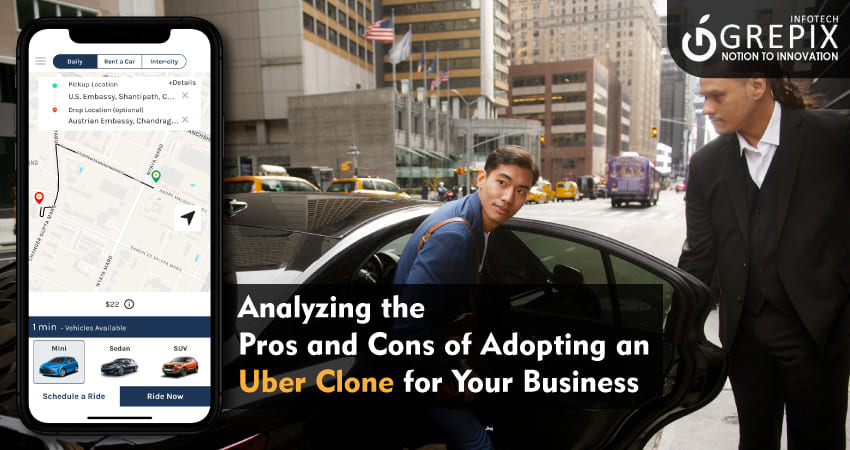
Analyzing The Pros And Cons Of Adopting An Uber Clone For Your Business
In today’s tech-driven world, the way people commute is evolving faster than ever.
Remember the days when you had to call a taxi dispatcher or hail a cab on the street?
Those days are nearly gone thanks to innovative ride-hailing app development led by global giants like Uber and Lyft. Uber, in particular, has redefined the transportation game with its on-demand model, leading many entrepreneurs to consider entering the market through an Uber Clone App.
But what exactly is an Uber clone?
It’s not just about copying Uber’s interface it’s about leveraging a white-label taxi app that replicates Uber’s business logic and technical architecture, offering customizable solutions for startups and enterprises alike.
Whether you’re looking to solve local commuting issues or build a scalable customizable ride-sharing platform, jumping on this bandwagon can be lucrative but it’s not without its challenges.
In this refreshed blog post, we’ll dig deeper into the pros and cons of adopting a taxi app clone, walk you through the features that matter, explain the common pitfalls, and help you evaluate whether this model aligns with your business goals.
The blog delves into the intricacies of adopting an Uber clone model for businesses, highlighting the swift market entry, cost-effectiveness, customization, and global reach as major advantages. However, it also addresses significant challenges such as stiff competition, regulatory hurdles, building customer trust, technological dependencies, and market saturation. Emphasizing the need for innovation and quality service, it advises careful consideration and thorough market research to differentiate and succeed. Appicial Applications is showcased as a veteran in taxi app development, offering robust solutions for businesses aiming to launch or upgrade to an Uber-like app, ensuring comprehensive support for tapping into full customer potential.
What Is an Uber Clone App, and Why Is It So Popular?
An Uber Clone App is a ready-made software solution designed to replicate the core functionalities and business model of Uber, the global leader in ride-hailing services. Instead of developing a mobile app from the ground up—which can take months of coding, testing, and refining entrepreneurs and businesses can use these clones as a shortcut to launching their own ride-hailing platform.
These apps come equipped with a wide range of built-in features, including:
- Real-time GPS tracking Enables passengers and drivers to view live locations, ensuring transparency, route optimization, and accurate ETAs.
- Automated fare calculation Calculates trip costs based on distance, time, and surge pricing in real-time, reducing fare disputes and enhancing customer trust.
- In-app ride booking Allows users to quickly book rides, view estimated arrival times, and choose vehicle types—all from a user-friendly interface.
- Driver-rider communication tools Offers in-app chat and calling features, facilitating seamless communication between drivers and passengers for coordination.
- Secure payment gateways Supports multiple cashless payment options like credit/debit cards, digital wallets, and even region-specific methods for convenience and security.
- Rating and review systems It allows both riders and drivers rate each other post-trip, promoting accountability and helping maintain a high-quality service standard.
- Admin dashboards Gives business owners and managers full control over operations, allowing them to track rides, manage users, analyze performance, and scale efficiently.
Pros of Uber Clone for Business
1 Proven Business Model
The Uber clone model rides on the back of Uber's successful business strategy. By adopting a model that has already been tested and proven in the market, entrepreneurs can bypass many of the initial hurdles related to market acceptance and business viability.
2 Quick Market Entry
Developing a mobile app from scratch requires time and significant financial investment. However, with an Uber clone, businesses can enter the market more quickly since the basic technology framework and business operations model are already in place.
3 Cost-Effective
Building a new app akin to Uber from the ground up can be prohibitively expensive. Using a clone model can significantly reduce development costs because the software development kit (SDK) or white-label solution can be customized at a fraction of the cost.
4 Customization and Scalability
Uber clone apps are highly customizable and scalable. Businesses can tailor the app to fit their specific requirements and scale up operations as the business grows without the need for extensive modifications.
5 Global Reach
The Uber model is not geographically confined. With appropriate tweaks to accommodate local regulations and market preferences, an Uber clone can operate in various regions worldwide, providing businesses with a broad market reach.
Cons of Uber Clone for Business
1 Competition and Differentiation
One of the biggest challenges of adopting an Uber clone model is the intense competition. Standing out in a market filled with similar services requires significant effort in marketing, service quality, and unique value propositions.
2 Regulatory Challenges
Uber itself has faced various regulatory challenges across different countries. Cloning its business model also means potentially inheriting these legal and regulatory hurdles, which can vary significantly from one region to another.
3 Customer Trust and Brand Loyalty
Building customer trust and loyalty from scratch can be daunting. Users already familiar with Uber may be skeptical about switching to a new, similar service, making customer acquisition more challenging.
4 Over-reliance on Technology
While technology is the backbone of the Uber clone model, it also poses a risk. Any technological failures, such as glitches in the app or server downtimes, can severely impact service reliability and customer satisfaction.
5 Market Saturation
Given the popularity of the Uber clone model, many markets are becoming saturated, making it harder for new entrants to capture significant market share without offering something truly innovative or at a lower cost.
Real-World Use Cases: Who’s Using Uber Clone Apps?
The versatility and scalability of an Uber Clone App make it an ideal solution across various industries, allowing businesses to streamline operations, reduce overheads, and meet evolving consumer expectations. Whether you're a startup founder or a traditional taxi service provider, the customizable ride-sharing platform model fits diverse operational needs.
Here are some of the most prominent real-world applications:
Local Taxi Businesses Going Digital
Many traditional cab services are turning to white-label taxi app solutions to modernize their operations. By adopting an Uber Clone App, they can offer on-demand ride booking, driver tracking, and digital payments—ensuring they stay competitive in an increasingly tech-driven market.
Entrepreneurs Targeting Niche Segments
Startups are leveraging taxi app clone solutions to serve unique demographics, such as women-only ride services, senior citizen transport, or pet-friendly rides. These niche-focused models use ride-hailing app development frameworks but introduce custom features that cater to specific audiences, creating strong brand differentiation.
Corporate Shuttle and Employee Transport Services
Companies are using Uber Clone Apps to manage employee transportation more efficiently. These customized apps help streamline pickup and drop-off schedules, monitor vehicle usage, and ensure employee safety, all while reducing administrative overheads.
Electric Vehicle (EV) Fleets
Green mobility startups and taxi operators with EV fleets are adopting customizable ride-sharing platforms to promote sustainable transport. These apps can include EV-specific features like charging station locators, battery status alerts, and eco-score tracking for conscious commuting.
Tourism and Travel Aggregators
In the tourism sector, taxi app clones are used by travel agencies and hotels to offer tourists convenient, app-based transportation during their trips. These platforms often include multilingual support, location-based suggestions, and in-app tour bookings to enhance the visitor experience.
How can you create a reliable taxi app?
Building and deploying your ride-hailing service using a white-label taxi app can seem like a smart and cost-effective way to enter the market quickly. However, not all solutions are created equal, and reliability should never be compromised for speed. Choosing the wrong provider or platform can lead to functionality issues, poor user experience, and long-term operational setbacks.
To ensure you’re building a dependable and scalable platform, it’s essential to thoroughly evaluate the software provider’s reputation, customer reviews, and post-launch support. A high-quality Uber Clone App should offer not just core features but also robust technical support, stringent security protocols, regular software updates, and reliable data backup systems.
If there’s any uncertainty about the trustworthiness or performance of a white-label solution, consider investing in custom taxi app development. While it may require a higher upfront cost, a tailor-made solution provides greater control, enhanced performance, and a unique market identity, helping you avoid the false economy of saving now but paying more later for fixes and upgrades.
Whether you're aiming for a customizable ride-sharing platform or a ready-made taxi app clone, reliability, security, and scalability must be at the forefront of your decision-making process. Remember, a seamless user experience and consistent service quality are what drive retention and growth in the competitive world of taxi app development.
Conclusion
The decision to adopt an Uber clone for business should not be taken lightly. While the model offers a quick and cost-effective route to market entry with a proven business strategy, it also comes with challenges such as competition, regulatory hurdles, and the need for differentiation. Entrepreneurs must conduct thorough market research, understand their unique value proposition, and carefully consider how they can stand out in a crowded market. Success in this arena requires more than just replicating a business model; it demands innovation, quality service, and a clear focus on customer satisfaction.
Appicial Applications is a seasoned player in the domain of taxi app development, offering solutions for businesses aiming to launch their own Uber-like app for seamless online management. Regardless of whether you're initiating a new venture or seeking to modernize your existing traditional taxi service by transitioning to a digital platform, Appicial Application's Uber Clone App stands prepared to assist you in tapping into your full customer potential.





